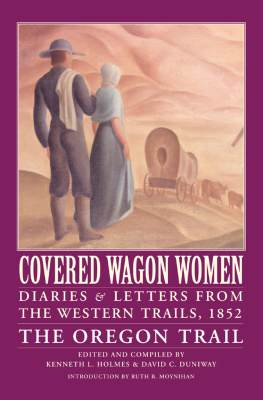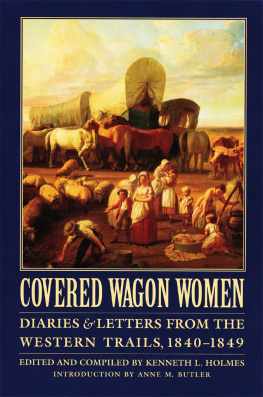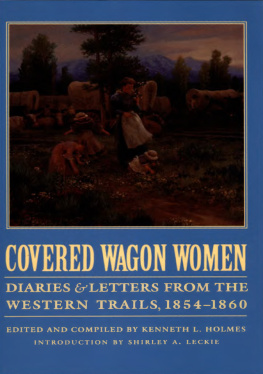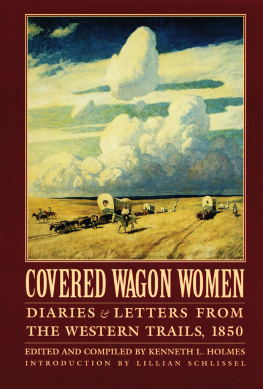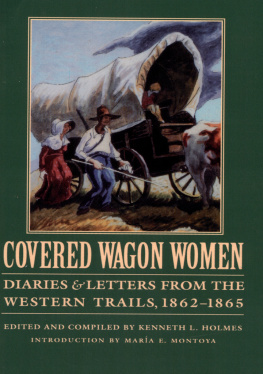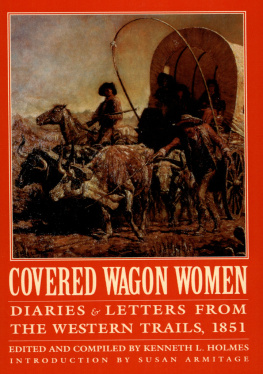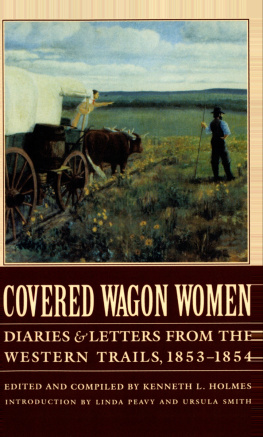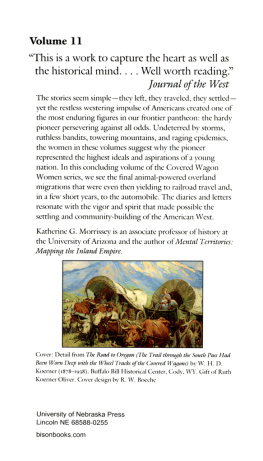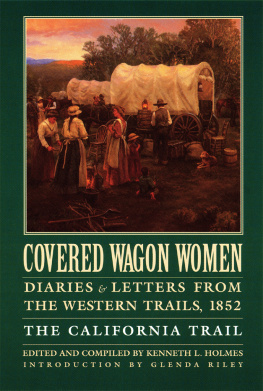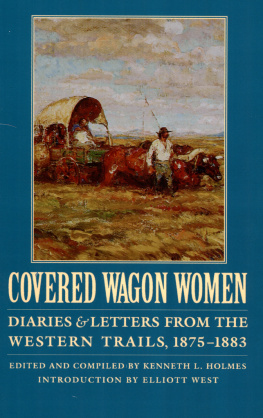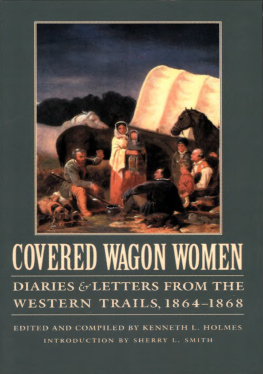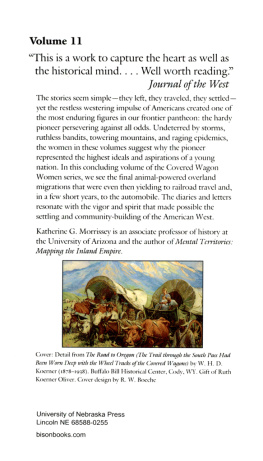Contents



1986 by Kenneth L. Holmes. Reprinted by arrangement with the Arthur H. Clark Company.
Introduction to the Bison Books Edition 1997 by the University of Nebraska Press
All rights reserved
Manufactured in the United States of America
The paper in this book meets the minimum requirements of American National Standard for Information SciencesPermanence of Paper for Printed Library Materials, ANSI Z39.48-1984.
First Bison Books printing: 1997
Library of Congress Cataloging-in-Publication Data
The Library of Congress has cataloged Vol. 1 as:
Covered wagon women: diaries & letters from the western trails, 1840-1849 / edited and compiled by Kenneth L. Holmes; introduction to the Bison Books edition by Anne M. Butler.
p.em.
Originally published: Glendale, Calif.: A. H. Clark Co., 1983.
Reprinted from volume one ... of the original eleven-volume edition
T.p. verso.
Volume 1.
Includes index.
ISBN 0-8032-7277-4 (pa: alk. paper)
1. Women pioneersWest (U.S.)Biography. 2. West (U.S.)History.
3. West (U.S.)Biography. 4. Overland journeys to the Pacific.
5. Frontier and pioneer lifeWest (U.S.) I. Holmes, Kenneth L.
F591.C791996
978dc2095-21200CIP
Volume 2 introduction by Lillian Schlissel.
ISBN 0-8032-7274-X (pa: alk. paper)
Volume 3 introduction by Susan Armitage.
ISBN 0-8032-7287-1 (pa: alk. paper)
Volume 4 introduction by Glenda Riley.
ISBN 0-8032-7291-X (pa: alk. paper)
Volume 5 introduction by Ruth B. Moynihan.
ISBN 0-8032-7294-4 (pa: alk. paper)
ISBN 978-1-4962-2558-0 (epub)
ISBN 978-1-4962-2559-7 (mobi)
Reprinted from volume five (1986) of the original eleven-volume edition titled Covered
Wagon Women: Diaries and Letters from the Western Trails, 1840-1890, published by
The Arthur H. Clark Company, Glendale, California. The pagination has not been
changed and no material has been omitted in this Bison Books edition.
The publisher does not have any control over and does not assume any responsibility for author or third-party websites or their content.
To C LYDE A. D UNIWAY (18661944),
historian, academic President,
fourth of the five sons of
Abigail Jane (Scott) Duniway. He read her Journal of 1852
to his sons at bed time,
and selections to students and public audiences.
Its publication here symbolically fulfills
his contract with the Arthur H. Clark Co.
of September 28, 1928.
Introduction to the Bison Books Edition
Ruth B. Moynihan
Where other folks have gone we certainly
can go; at any rate we think so.
Abigail Jane Scott
This volume in the Covered Wagon Women series includes the diary of one of the most important women in Pacific Northwest history. Abigail Jane Scott, who married Benjamin Duniway only ten months after she arrived in Oregon in September 1852, became a writer, editor, mother of six children, and Oregons Mother of Woman Suffrage. During the sixty years after she wrote this journal, Abigail Scott Duniway was one of Oregons most notable womenwriting, lecturing, traveling, publishing a weekly newspaper, and fighting for equality of opportunity and the right to vote.
Oregon finally approved woman suffrage in 1912, following several other western states. Abigail Duniway had prepared the way through her weekly newspaper, The New Northwest (187187), and her frequent lecture tours, by stagecoach and buck wagon and even horseback, throughout the rugged pioneer country of the Pacific Northwest. Having survived the overland trail, there were few other obstacles that could ever faze her.
Seeing so much death and suffering at such a young age was undoubtedly one important factor in transmuting the character of sensitive Abigail Jane Scott into that of the redoubtable Mrs. Abigail Duniway, a woman of suffragist zeal, indomitable energy, and fearless conviction. She recognized this herself when she used the diary as source material for her first published novel, transforming her passion into nostalgic sentimentality and heroine-worship. But the anger and the womens rights zeal remained a prime component.
One of Abigail Duniways farm neighbors in Clackamas County when she was first married was Cecilia Adams, another of the diarists in this book. Cecilia was the wife of William Adams, sharp-tongued newspaper editor and founder of the Republican Party in Oregon. It was in Adamss weekly Oregon City Argus that Abigail Duniway published her first poems and articles. After moving to Hillsboro, the Adamses and Parthenia and Blank, Cecilias sister and her husband, undoubtedly knew Tucker Scott, who settled in Forest Grove in 1859. All of them were involved with the Tualatin Academy and Pacific University, to which Tucker Scott contributed land. The world of these frontier pioneers was small and interconnected, despite the great distances of their journeys. The bond of a shared overland trail experience was powerfuland never forgotten.
The journey itself was usually a joint venture, involving brothers and sisters and in-laws and nephewswhole networks of families, seldom just independent individuals. One has only to look at the names and relationships of those who traveled with the Scotts, or with Polly Coon, or with the twins, Cecilia Adams and Parthenia Blank. In each case, other relatives had already made the trip in the 1840s, settling in Oregon and providing crucial help to the newcomers in the last stages of their journey as well as when they arrived.
Historians know that such group relationships have been common in all the great migrations that make up American history. It was not just the Native American Indians who moved from place to place (especially under the pressure of other population movements). Immigrantsfrom seventeenth-century English Pilgrims to eighteenth-century Scotch-Irish, from nineteenth-century Italians, or eastern European Poles and Jews, or Scandinavians, to twentieth-century Central Americans or southeast Asianshave followed similar patterns of family and village migration. People go where they already have relatives or friends. People survive by means of networks of communication and mutual aid. Americas frontier travelers and settlers were no exception.
In fact, looking at these diaries, one sees that in each family history there were several previous migrations. Over several generations the Scotts had moved from western Virginia to North Carolina to Kentucky to Illinois before going to Oregon. Polly Crandall Coons father had moved from Connecticut to western New York to Wisconsin before they went to Oregon. Martha Read was born in Massachusetts, married and moved to western New York, then moved with her family to Illinois before they decided to go to Oregon. The twins Cecilia Adams and Parthenia Blank were born in New York and married in Illinois before they and their husbands and their father and other relatives all traveled to Oregon to join an older brother.
When seventeen-year-old Abigail Jane Scott began writing about her familys journey westward in 1852, she already shared in the sense of high purpose and great loss that marked almost all womens narratives about the trail. One can see the loss in her first entry, where she speaks of bidding farewell forever to the home of my childhood. But one can also hear the youthful excitement in her reference to being seated by a blazing fire with Heavens canopy over my head trying to compose my mind.

